Related Research Articles

Grenville Lewis Jr. was an American college football player and coach, an early professional football player, and an engineer and cattle rancher. He served as the head football coach at Maryland Agricultural College—now known as the University of Maryland, College Park—in 1896, compiling a record of 6–2–2.

Thomas Gawthrop "Doggie" Trenchard was an All-American football player at Princeton University in 1893 and a college football head coach at the University of North Carolina at Chapel Hill, the University of Pittsburgh, and West Virginia University.

Charles Gelbert was an American football player, nicknamed "the Miracle Man" because he did so much with so little. He was a four-year starter for the Penn Quakers, from 1893 to 1896, and played guard and end. During his time at Penn, the school's football teams won consecutive national champions with undefeated seasons in 1894 and 1895. He also earned All-American honors from Walter Camp in 1894, 1895, and 1896. He was elected to the College Football Hall of Fame in 1960. In 1912, Jack Kofoed, writing in the Philadelphia Record, named Gelbert to his all-time All-America team.

Charles Ramsay Rinehart was an American football player, engineer and businessman. He was elected to the College Football Hall of Fame in 1964. He played high school football at Phillipsburg High School in Phillipsburg, New Jersey.
Alfred E. Bull was an American football player, coach, rower, and dentist. He played football at the University of Pennsylvania and was selected as a center to the 1895 College Football All-America Team. Bull later served as the head football coach at the University of Iowa (1896), Franklin & Marshall College (1896–1897), Georgetown University (1900), Lafayette College (1903–1907), and Muhlenberg College (1908–1910), compiling a career college football coaching record of 62–34–15.
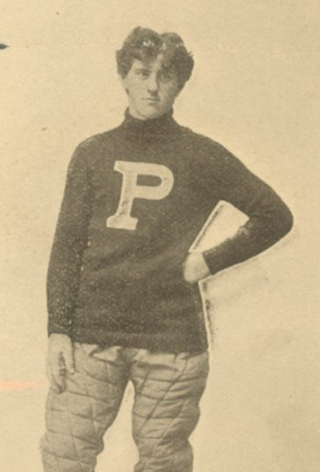
Otman Franklin "Otto" Wagonhurst was an American football player and coach. Wagonhurst played college football as a left tackle at the University of Pennsylvania from 1892 to 1895. He served as the head football coach at the University of Alabama in 1896 and at the University of Iowa in 1897, compiling a career record of 6–5. After coaching college football, he played professionally for Pittsburgh's Duquesne Country and Athletic Club and the Homestead Library and Athletic Club. He won circuit championship titles with Duquesne in 1898 and 1899 and Homestead in 1900. After his football career, he went on to become a railway executive. He died in 1932 in Jackson, Michigan and was buried in Akron, Ohio.

Walter Raleigh "Okey" Okeson was an American football player and coach. He was a player-coach for the first all-professional football team, the Latrobe Athletic Association club in 1897. Okeson was the head football coach at Lehigh University in Bethlehem, Pennsylvania for one season, in 1900, compiling a record of 5–6.
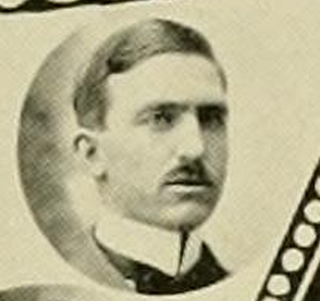
George R. Krebs was an American football player and coach. He served as the fifth head football coach at West Virginia University in Morgantown, West Virginia and he held that position for the 1897 season, in which he also captained the team. His coaching record at West Virginia was 5–4–1. A native of New Martinsville, Krebs graduated from West Virginia University in 1899 in with a degree in engineering.
The Latrobe Athletic Association was a professional football team located in Latrobe, Pennsylvania, from 1895 until 1909. A member of the unofficial Western Pennsylvania Professional Football Circuit, the team is best known for being the first football club to play a full season while composed entirely of professional players. In 1895, team's quarterback, John Brallier, also became the first football player to openly turn professional, by accepting $10 and expenses to play for Latrobe against the Jeannette Athletic Club.
The Greensburg Athletic Association was an early organized football team, based in Greensburg, Pennsylvania, that played in the unofficial Western Pennsylvania Professional Football Circuit from 1890 until 1900. At times referred to as the Greensburg Athletic Club, the team began as an amateur football club in 1890 and was composed primarily of locals before several professional players were added for the 1895 season. In 1894 it was discovered that the team had secretly paid formerly Indiana Normal player, Lawson Fiscus, to play football and retained his services on salary. The team was the chief rival of another early professional football team, the Latrobe Athletic Association.
The Duquesne Country and Athletic Club was a professional football team based in Pittsburgh, Pennsylvania from 1895 until 1900. The team was considered one of the best, if not the best, professional football teams in the country from 1898 until 1900. However, the team is most famous for being the first football franchise to be owned by an individual, William Chase Temple.
Willis Richardson was an American professional American football player-coach for the Homestead Library & Athletic Club and the Pittsburgh Stars of the first National Football League (NFL). He won the Western Pennsylvania State Championship with Homestead in 1900 and 1901. Then in 1902, he brought along many former Homestead players to the Stars team, which was formed by the former Latrobe Athletic Association manager, Dave Berry, and probably funded by the Barney Dreyfuss and William Chase Temple of the Pittsburgh Pirates baseball team. During the Stars "championship game" against the Philadelphia Athletics, Willis scored an extra point to help lead the Stars to an 11–0 victory and the 1902 championship.

David J. Berry was an American football manager during the late 19th and early 20th centuries. He was the top promoter for the sport during that time period. He is credited with inventing the "all-star game concept" in 1898, and also helped to form one of the first organized football leagues in 1902.

William Wells Church was an American football player and coach. A native of Chicago, he played college football at Princeton University, where he was selected as an All-American at tackle in 1896. He served as the head football coach at Purdue University for one season, in 1897, and at Georgetown University for two seasons, in 1899 and 1901, compiling a career college football record of 5–3–1. Church participated in early professional football: He played tackle for the Duquesne Country and Athletic Club in 1898 and the Homestead Library & Athletic Club in 1900, also coaching the latter team. He married Mary Myrtle Brock in 1902.
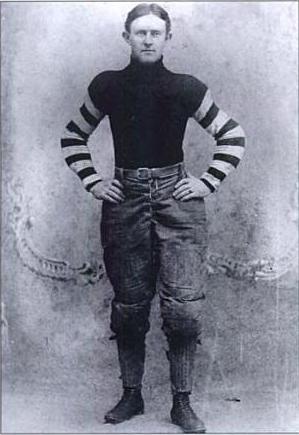
John Ashley "Daff" Gammons was an American baseball and football player, college football and baseball coach, amateur golfer, and insurance agent. He played professional baseball for one season, 1901, for the Boston Beaneaters. Gammons served as the head football coach at Brown University in 1902, 1908, and 1909, and as its head baseball coach from 1901 to 1903.
The 1898 Western Pennsylvania All-Star football team was a collection of early football players, from several teams in the area, to form an all-star team. The team was formed by Dave Berry, the manager of the Latrobe Athletic Association, for the purpose of playing the Duquesne Country and Athletic Club, which fielded a team composed of many of the game's stars from the era. The game between the two clubs ended in a 16-0 Duquesne victory and is considered to be the first all-star game for professional football. Contrary to popular belief, while the game was held at Exposition Park, which would be currently located inside of the city limits of Pittsburgh, Pennsylvania, the 1898 location of the game was Allegheny, Pennsylvania which was not incorporated into the city of Pittsburgh until 1907.
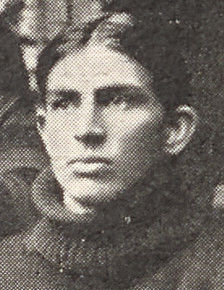
M. Roy "Slab" Jackson was an early professional football player who played for the Duquesne Country and Athletic Club. He also served as the team's captain and coach in 1898–1900. Jackson, a fullback, scored 14 touchdowns, often on short plunges after teammates J. A. Gammons or Dave Fultz had put the ball close to the end zone. In 1898, Jackson played for Duquesne against the Western Pennsylvania All-Stars in the first pro football all-star game. During the game, he would score two of the Duquesnes touchdowns.
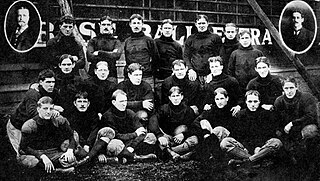
The 1898 Duquesne Country and Athletic Club football season was their fourth season in existence. The team finished with a record of 11–0–1. The team was named the top team in western Pennsylvania. Roy Jackson was the team's captain and coach.
American football in Western Pennsylvania, featuring the city of Pittsburgh and surrounding areas, has had a long and storied history, dating back to the early days of the sport. All levels of football, including high school football and college football, are followed passionately, and the area's National Football League (NFL) team, the Pittsburgh Steelers, is consistently one of the sport's most popular teams. Many of the NFL's top stars have come from the region as well, especially those that play quarterback, earning Western Pennsylvania the nickname "Cradle of Quarterbacks".
The Western Pennsylvania Professional Football Circuit was a loose association of American football clubs that operated from 1890 to approximately 1940. Originally amateur, professionalism was introduced to the circuit in 1892; cost pressures pushed the circuit to semi-professional status from about 1920 through the rest of its existence. Existing in some form for 48 years, it was one of the longest-lived paying football loops to operate outside the auspices of the National Football League.
References
- ↑ "Experts Will Handle Game". The Pittsburgh Press. November 15, 1902.
- ↑ "Pennsylvania's Crew". Cornell Daily Sun. Vol. 15, no. 172. June 20, 1895.
- ↑ "The Pennsylvania Team. - News - The Harvard Crimson". www.thecrimson.com.
- ↑ PFRA Research. "Stars Over All-Stars: An All-Star Team: 1898" (PDF). Professional Football Researchers Association. p. 3. Retrieved February 3, 2024.